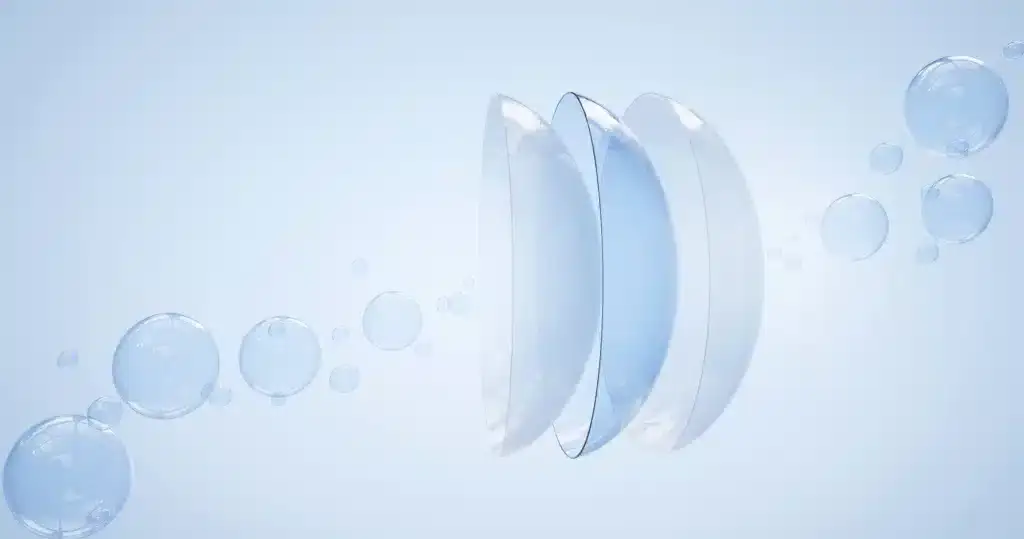Most people who wear contacts use soft contact lenses, which are flexible and the same size as the cornea. But if you suffer from certain eye conditions or have an irregularly shaped cornea, your eye doctor may recommend scleral contact lenses. What are scleral lenses? They’re harder in texture and larger in diameter when compared to soft contacts. In fact, they actually rest on the whites of your eyes, which are also known as the sclera — hence, the name scleral. To learn who might benefit from scleral lenses and explore some of their pros and cons, simply scroll down.
Scleral Lenses 101
What are scleral lenses? They’re a special type of contact lens that sometimes proves useful to people who can’t wear traditional soft contact lenses because they have an irregular corneal shape or a specific eye-related disease. For example, soft contact lenses can be uncomfortable for people who suffer from dry eyes, Stevens-Johnson syndrome, Sjogren’s syndrome, keratoconus (an abnormally shaped cornea), or graft-versus-host disease. In addition, people who have undergone corneal surgery are sometimes unable to wear soft contact lenses. In these and other cases, an eye doctor may recommend scleral lenses as an alternative.
Scleral lenses are typically between 14 and 24 millimeters in diameter, making them larger than the cornea. They actually vault over the entire corneal surface to rest on the sclera, which is tougher than the cornea, and they contain a reservoir that holds fluid. Scleral lenses can functionally replace an irregular cornea with a perfectly smooth ocular surface, correcting vision problems caused by that corneal irregularity. In addition, scleral lenses’ fluid reservoirs can provide comfort for people who suffer from dry eyes.
Because of scleral lenses’ unique structure, putting them in requires a little extra effort. You must fill the lens well with a preservative-free saline solution and check that there are no bubbles, as bubbles can cause blurriness. Then, you can place the lens on your eye using a typical three-finger tripod method. The cleaning and disinfection process is also a little more involved.
Like contact lenses, scleral lenses can correct poor vision caused by refractive errors, such as nearsightedness (myopia), farsightedness (hyperopia), distorted vision (astigmatism), and difficulty with near vision with age (presbyopia). However, they’re known to provide crisper and clearer vision when compared to soft contacts. They’re also easier to handle, more durable, and have a lower risk of complications. That said, they’re also more expensive.
What Are Scleral Lenses Made Of?
Scleral lenses are made from a highly breathable, gas-permeable lens material. This ensures that plenty of oxygen is able to reach the cornea, which is important for eye health and comfort. In addition, scleral lenses are able to be used for longer periods because of their breathability. Scleral lenses are custom-made to fit your eyes, so achieving a proper fit is vital. Because of their large diameter and unique shape, it may take a little time for you to get used to scleral lenses.
_____
What are scleral lenses? They’re a unique type of contact lens that is large in diameter, highly breathable, and designed for people with certain corneal irregularities or ocular conditions who haven’t had success with traditional soft lenses. To learn if they make sense for your vision needs, you’ll need to schedule an appointment with an eye care professional.
If you live near southwest Missouri, contact Heffington’s. Since 1975, the Heffington family has been assisting the Springfield community with top-quality eye care and affordable eyeglasses and contacts. One of the unique features of our family-owned business is that we manufacture lenses at our own laboratory, giving us total control over the service and pricing, and we’re happy to pass our savings on to you. To learn more about our products and services, please get in touch with us online, send an email to asktheexperts@heffingtons.com, or give us a call at 417-869-3937 (Optiland location) or 417-882-3937 (House of Vision location). We look forward to hearing from you!

